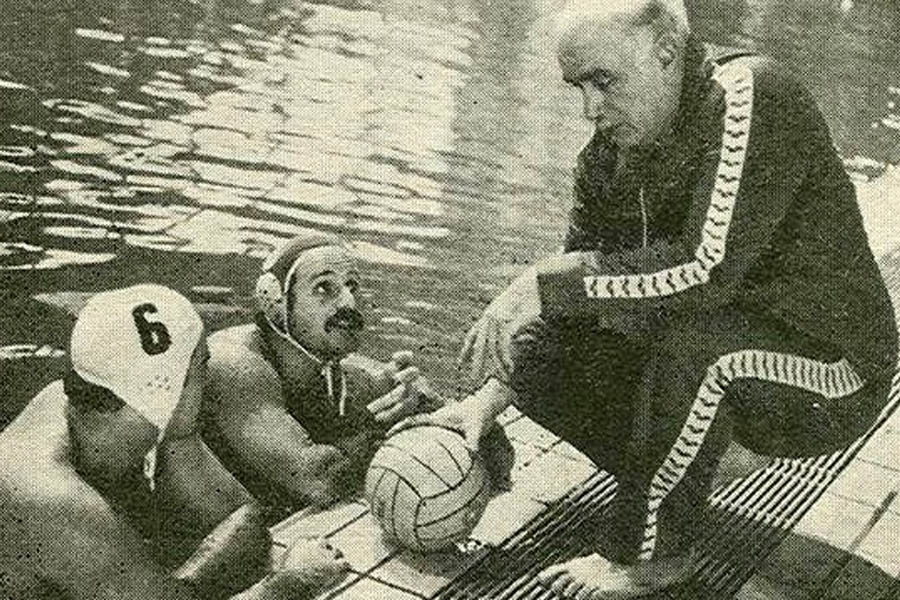Basic Information
| Field | Detail |
|---|---|
| Full name | Pyotr Yakovlevich Mshvenieradze (Georgian: Petre Mshvenieradze) |
| Nickname | “Peter the Great” |
| Birth | March 24, 1929, Tbilisi, Georgian SSR, USSR |
| Death | June 3, 2003, Moscow, Russia |
| Nationality | Soviet (Georgian origin) |
| Sport | Water polo |
| Positions/roles | Player; Team captain of the USSR |
| Clubs | Dinamo Tbilisi; Dynamo Moscow |
| National team | USSR (senior debut in 1949) |
| Olympic participation | 1952 (Helsinki), 1956 (Melbourne), 1960 (Rome) |
| Olympic medals | Bronze (1956), Silver (1960) |
| Family | Sons: Nugzar/Nuzgari Mshvenieradze (b. c. 1952), Giorgi Mshvenieradze (b. Aug 12, 1960) |
A Georgian giant of Soviet water polo
Pyotr Mshvenieradze’s story begins in Tbilisi in 1929, where the currents of the Kura River and the sporting milieu of postwar Georgia shaped a prodigy with a commanding presence. By 1948 he had joined Dinamo Tbilisi; within a year he was on the USSR senior national team. In an era when sport often mirrored geopolitics, he became a standard-bearer—one of the most recognizable faces in Soviet water polo, revered for authoritative leadership and technically disciplined play. Teammates remembered a captain who steadied the ship in rough waters; rivals respected a competitor whose composure could turn a pool into a chessboard.
Captain of a Cold War team: Olympic campaigns
Three Olympic Games bookend Mshvenieradze’s prime. In Helsinki 1952, a youthful USSR squad placed outside the medals but gathered invaluable experience. Four years later, Melbourne 1956 delivered the bronze—a breakthrough that signaled the USSR’s rising tide in aquatic sports. The tournament also etched a moment of high drama into history: the charged semifinal against Hungary, later called “Blood in the Water,” where political tensions from the Hungarian Revolution spilled into the pool. Mshvenieradze’s leadership in that furnace—calm, uncompromising—became part of his legend.
Rome 1960 brought the silver medal and a fuller realization of his vision for the team. He logged heavy minutes throughout the tournament and contributed on both ends of the pool, anchoring a defense that could suddenly blossom into attack. It was a silver with the gleam of discipline, preparation, and years of accumulated craft.
Beyond the Olympics: domestic dominance and European stages
Olympic laurels tell only part of the tale. At home, Mshvenieradze’s clubs—first Dinamo Tbilisi, later Dynamo Moscow—were perennial forces, winning domestic championships and shaping the tactical core of the national team. Across European competitions he amassed podium finishes and titles that reinforced the USSR’s sovereignty in the sport during the 1950s and early 1960s. Whether marshaling a zone defense or triggering lightning-quick counters, he was both metronome and hammer.
His career arc, 1948–1963, maps onto the USSR’s surge from promising contender to established power in international water polo. By the time he retired, his imprint was everywhere: in training methods, in the centrality of conditioning, and in the ethos of collective responsibility.
A family braided into the sport
Water polo was not just Pyotr’s vocation; it became a family language. His elder son, Nugzar (also recorded as Nuzgari), born in the early 1950s, emerged as a high-level player for the Soviet Union, collecting domestic honors and international experience. His younger son, Giorgi, born August 12, 1960, followed suit with distinction—competing at the 1980 and 1988 Olympic Games and earning medals on both occasions. Between them, the Mshvenieradzes formed a multigenerational bridge in Soviet and post-Soviet water polo, with Pyotr offering mentorship that blended technical rigor and tactical intelligence.
In training halls and pool decks of the 1980s, father and sons could be seen parsing angles, testing rhythms, and refining positioning—a living seminar in the craft. The surname became shorthand for excellence, the kind of legacy that does not merely pass down but grows roots.
Coaching, mentorship, and later life
If leadership was the hallmark of Mshvenieradze’s playing days, mentorship defined his later years. He advised and coached, particularly guiding his sons and their generation. His counsel emphasized adaptability—the idea that superior teams are fluent, able to shift between styles and tempos. By the 1990s, his public appearances were fewer, but photographs from that decade—family moments, a grandfather’s pride—circulated widely and later resurfaced online, reinforcing the mythic silhouette of a champion turned patriarch.
He died in Moscow on June 3, 2003, aged 74. The flow of tributes that followed was steady and warm: teammates recalling a captain’s trust, opponents recalling a gentleman’s grace, and younger athletes recalling a teacher who demanded much but gave more.
Money, status, and the Soviet sporting system
Like most elite athletes of his era, Mshvenieradze competed under a state-supported model. Instead of modern sponsorships, compensation came as stipends, club employment, housing, and privileges within a centrally planned ecosystem. There are no credible net-worth estimates or personal financial profiles attached to his name, a reminder that Soviet champions were measured in medals and service more than in endorsements.
Memory in the digital age
In recent years, the currents of memory have moved online. Archival footage of mid-century matches—grainy, mesmerizing—circulates on video platforms. Anniversary posts revisit his Olympic campaigns and his role in iconic Cold War-era contests. A striking family photograph from the 1990s has been shared and reshared on social media, prompting admiration for his formidable build and rekindling interest in a dynasty that spanned decades of aquatic excellence. No fresh controversies or revelations follow him—only the steady echo of respect.
Career timeline
| Year | Milestone |
|---|---|
| 1929 | Born March 24 in Tbilisi, Georgian SSR (USSR). |
| 1948 | Joins Dinamo Tbilisi. |
| 1949 | Debuts for the USSR senior national team. |
| 1952 | Competes at Helsinki Olympics (first Olympic appearance). |
| 1956 | Wins Olympic bronze at Melbourne; captains the USSR in a politically charged tournament. |
| c. 1952 | Birth of elder son, Nugzar/Nuzgari (approximate). |
| 1960 | Wins Olympic silver at Rome; consolidates status among the sport’s elite. |
| 1960 | Birth of younger son, Giorgi (August 12). |
| 1963 | Concludes playing career after a sustained run with Dynamo Moscow. |
| 1980s | Mentors and coaches, including his sons, extending the family tradition. |
| 1990s | Family photographs and archival clips later gain renewed attention online. |
| 2003 | Dies June 3 in Moscow at age 74. |
Style of play and sporting imprint
Mshvenieradze’s water polo reflected the architecture of his era: structured, physical, deliberate. He thrived in contact, relished positional battles, and prized clarity over flourish. Yet within that discipline lived a strategist’s flair—a capacity to read a match like a map, to move pieces and people into the most efficient patterns. His teams could grind when required and accelerate when opportunity called. The metaphor is apt: he was both keel and sail.
Crucially, his influence extended beyond the scoreboard. Captaining the USSR during turbulent years, he embodied the subtle diplomacy of sport—the handshake after the whistle, the respect for adversaries who remained friends beyond lanes and flags. This dual legacy—of medals and manners—illuminates why his name still resonates.
Family legacy in context
Measured across decades, the Mshvenieradze line looks like a relay: Pyotr setting pace and tone, Nugzar and Giorgi carrying the baton through the 1970s and 1980s, and younger generations absorbing the lore. Giorgi’s successive Olympic podiums gave the family story a modern chapter, while Nugzar’s steady excellence on club and national stages affirmed the breadth of their contribution. In the annals of Soviet and Georgian sport, few families are so closely stitched into one discipline’s narrative.
FAQ
Who was Pyotr Mshvenieradze?
A Georgian-born Soviet water polo great, he captained the USSR team and won Olympic medals in 1956 and 1960.
When and where was he born and when did he die?
He was born on March 24, 1929, in Tbilisi and died on June 3, 2003, in Moscow.
Which Olympics did he compete in and what medals did he win?
He competed at the 1952, 1956, and 1960 Olympics, earning bronze in 1956 and silver in 1960.
Was he involved in the “Blood in the Water” match?
He played at the 1956 Melbourne Games, where the infamous Hungary–USSR clash occurred, and is widely associated with that charged tournament.
What clubs did he represent in his career?
He played for Dinamo Tbilisi and later for Dynamo Moscow, two pillars of Soviet water polo.
Who are his children and did they play water polo?
Yes; his sons Nugzar/Nuzgari (b. c. 1952) and Giorgi (b. 1960) both played at elite levels, with Giorgi medaling at the Olympics.
Did he coach after retiring?
He moved into mentorship and coaching roles, particularly guiding his sons and younger players during the 1980s.
How was he compensated during his career?
As a Soviet-era athlete, he received state-backed support such as stipends and club employment rather than commercial endorsements.
What is his enduring legacy?
A captain’s poise under pressure, a family dynasty in the sport, and a portfolio of medals that helped define Soviet water polo’s ascent.
Is there recent news about him?
Contemporary mentions are commemorative—archival videos and social media tributes—reflecting continued respect for his legacy.



